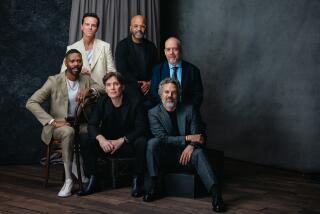A singular experience
- Share via
Of all the acclaim that’s come to Colin Firth’s depiction of hidden grief in “A Single Man,” precious little of it has focused on the physical Firth. At 49, the Golden Globe nominee looks 10 years younger and as fit as he was in those glory days as Mr. Darcy on TV’s “Pride and Prejudice.”
“I pick up the script, and it says ‘Naked man lies on bed.’ And then a few pages in, ‘Naked man jumps in ocean,’ ” Firth recalls. “ ‘Well,’ I thought. ‘It’s time. One more push against gravity before I turn 50 and it’s all downhill.’ ”
The actor whipped himself into shape, physically and mentally.
And the result is one of the most lauded performances of the year, a film that has already earned Firth a lovefest from the press.
“I’m thrilled by the way people are reacting to this film, partly because this film is small, personal, and I didn’t feel like I was part of some big scene, some huge film,” he says from London.
“To be given a whole day in the life of a man, playing a character who is never off-screen, and be working with such a small group of people and do it in just 21 very intense and intimate days, and then have people love it? That’s as good as it gets.”
But he’s been here before -- the acclaim, the high profile. He knows better than to let it go to his head.
“This is happening as I continue my day job. Filming another movie [“The King’s Speech”] that’s just as intense, with just as long hours. So while I’m glowing from the fact that people are saying lovely things about this film, I’m in the middle of working on the next one, which keeps your feet on the ground.”
Firth had his first blush of stardom during the mania of 1995’s “Pride and Prejudice,” a TV miniseries adapted from Jane Austen that so took over Britain that it inspired “Bridget Jones’ Diary,” with Firth going on to play the Darcy-ish lead in that too, opposite Renee Zellweger.
Mark Strong, who worked with him back then (they did “Fever Pitch” in 1997), says, “What’s wonderful about something like this is that it’s happening this time to someone who has been doing it long enough to know the vagaries of the business. It’s not a linear career, this movie acting thing. It’s like a wave, an up and down thing. He had it when he was Mr. Darcy. ‘Wow! You’re going to be on top of the world!’ But he goes back to doing interesting parts that maybe weren’t as visible. And years later he’s hot again. He deserves it.”
Firth says the experience of making “A Single Man” -- a movie with a lean budget, a fashion-designer-turned-filmmaker as director (Tom Ford) and not a lot of co-stars on the set -- “was maybe the most intense acting experience of my life. The character is so focused, so sad and so determined to take care of the things he needs to see to before he kills himself.”
In that compact period of time, it was easier to stay focused on his character’s morose frame of mind -- the “acceptance” stage of Elisabeth Kubler-Ross’ five mental stages of death and dying.
“People, intentionally or inadvertently, keep trying to save George,” Firth says of his “Single Man,” a college professor. In the film, George meets neighbors, strangers, fellow professors, a student with a crush on him (Nicholas Hoult). “They all say to him, one way or the other, ‘Live. Live!’ And he won’t be swayed.”
What kept the actor going was “focusing on the ‘positive choice.’ Unhappiness is what we struggle against. So you don’t play unhappiness. What I play is George’s attempt to mask or overcome this heartbreak. Grief is the enemy. He wants peace, so the decision to kill himself is the desire for peace, and he’s accepted that.”
Over the years, Firth says, “you get older and lose things and can’t recall what you were thinking or feeling while you made a movie. You develop stock answers to interview questions, which you recycle from film to film. You lose the truth.
“But the intensity of this experience I can recall more clearly than any other. And funnily enough,” he says, chuckling, “when I close my eyes and think of this movie, I see Nick Hoult’s incredible blue eyes looking back at me.”
Moore writes for the Orlando Sentinel.


